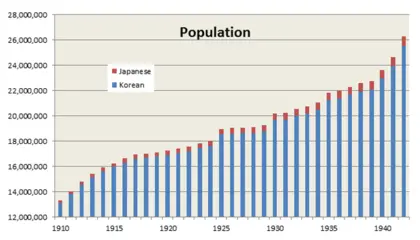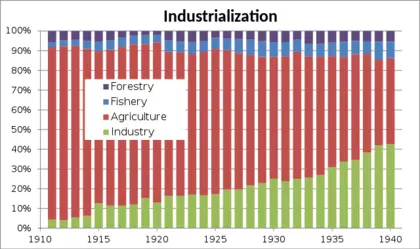During the annexation of Japan and South Korea, the Korean Peninsula modernized and achieved economic growth. This is contradictory data from the South Korean government, which does not want to admit
2021-12-30
Category:Annexation of Japan and Korea I'm participating in the ranking.Please click and cheer for me.
Japan-Korea annexation as seen from data released by the Korean government
This is the actual state of the Korean peninsula during the annexation of Japan and Korea, as published by the Korean Statistical Office.
Number of doctors: increased approximately 7 times
Number of deaths due to infectious diseases: Significant decrease
Water supply amount: increased approximately 4.8 times
Number of kindergartens: approximately doubled in 10 years
Child protection business: Increased approximately 4.3 times
Number of public elementary schools: increased approximately 7.5 times
Population: Increased approximately 1.8 times
The number of robberies has significantly decreased, etc.
MEMO During the Japanese colonial period, the Korean peninsula experienced significant economic growth and was on the path to modernization.
It was not a time of enslavement, but a time when people felt a sense of enrichment in their lives
South Korea has complained to the international community that it was annexed by Japan, enslaved, and massacred, but its population appears to be increasing.
Read it together
Geographically, the Korean Peninsula is covered by the Chinese continent, and successive Korean dynasties have become vassal states - What is Japan's position from the perspective of the continental p
Geographically, the Korean Peninsula is covered by mainland China
A vassal state of China since its founding
Korea continues to be invaded by China
China and Korea were ruled by different ethnic groups
Seeing history from the perspective of northern peoples
South Korea only denounces Japanese rule
The Korean Peninsula has a history that is inseparable from China, as the peninsula's geographical characteristics make it look like it is completely covered by the Chinese continent.
What exactly is this sense of victimhood and hostility toward Japan that Korean people have? The historical differences between China and Japan seen from South Korea are largely due to geopolitical reasons as seen from a map, but that is not the only reason. I would like to think about it in terms of the dominant ethnic group and the ruled ethnic group.
Legend has it that there were countries called Dangun Joseon and Minojo Joseon, but archaeologically it is said that they existed from the later Eishi Joseon.
The legendary Mino Korea is said to have been founded by the Mino of the Shang Dynasty in China, and the Wei Dynasty Joseon is said to have been founded by the Wei clan of the Yan Dynasty in China. Both were founded as vassal states of China.
After that, Goguryeo, Baekje, and Silla entered the Three Kingdoms period, and then the Sui Dynasty invaded Koguryo, and the Tang Dynasty invaded Koguryo.
Although Goryeo established a unified dynasty, it was placed under the control of the Later Tang Dynasty shortly after its founding. During the Yuan Dynasty, China was invaded by the Mongol Empire and became a vassal state. The Allied Forces of Mongolia and Goryeo invaded Japan twice, but failed.
Lee Seong-gye, who founded the Joseon Dynasty, is also known as the Jurchen people, and the Jurchen people were an ethnic group that lived in the Manchuria region, and later Hong Taiji founded the Qing Dynasty in China.
From China's point of view, the Korean people are recognized as a different ethnic group living outside the Great Wall of China, and these ethnic groups lived primarily as nomadic peoples, but due to the geographical relationship of the peninsula, the Korean people have decided to settle down. It seems that it has become.
Northern ethnic groups such as the Xiongnu, Xianbei, Khitan, Jurchen, Manchu, and Mongolians were a threat not only to the Han Chinese in China, but also to the Koreans.
Looking at the history of China, there have been only a handful of unified dynasties founded by the Han Chinese, who make up the majority of the country, and for most of its history, different ethnic groups have ruled the Chinese mainland.
When I look at world history, I have never seen a history centered on northern peoples, but if I dare to look at it from that perspective, both China and the Korean peninsula were invaded and dominated by northern peoples.
The Sui, Tang, and Yuan dynasties that invaded the Korean Peninsula mentioned above are different ethnic states in China if you consider them centered on the Han people. It is also a country of different ethnic groups when viewed from the perspective of the Korean Peninsula.
In addition to small-scale direct invasions by foreign ethnic groups, the majority of the history of the Korean peninsula is that they invaded the peninsula after taking control of mainland China.
In this composition, Japan is classified as one of China's peripheral ethnic groups. Geographically speaking, Japan is called Toi in contrast to Northern Yi. They are a neighboring ethnic group common to China and the Korean Peninsula.
If we look at the annexation of Japan and Korea in the above sense, it means that the Korean peninsula was ruled by a different ethnic nation that also shared China. It is also a foreign country to China.
Some people point out the contradiction in that Koreans do not complain about the fact that they were ruled by China for over 1,000 years, but they hold a grudge against Japan for 1,000 years only for 35 years, but in reality, the country of China itself is the same. I wonder if there is a complicated background to the history of a controlled area.
Historically, Japan may still be recognized as a common enemy of China and the Korean Peninsula.
It is said that South Korea's sense of victimhood is something that has been cultivated historically, but if you look closer at the globe, you can see that mainland China has also had a history of being invaded. Based on this, Japan should resolutely clarify its position.
The period of annexation between Japan and Korea is approximately 35 years. The reasons why the population increased 1.8 times during this period include maintaining public order, improving medical care, and reducing poverty.
Public order is maintained through laws, police, and the spread of education, and medical care is achieved through the addition of medical personnel and the provision of medicines, medical equipment, and other supplies.
Reducing poverty requires increasing employment through the creation of many jobs and improving the food situation. Japan's social improvements in all of these areas resulted in population growth.
POINT Even though this data is published by the South Korean government itself, the country as a whole is repeating completely contradictory claims.
I'm participating in the ranking.Please click and cheer for me.
Myeong-dong in Seoul is Meiji Town, which was created by the Japanese. Many Korean-language movies and entertainment were shown at Meijiza.
Myeong-dong is a representative downtown area and tourist destination in South Korea, but it was originally developed as Meiji Town during the Japanese colonial era. There are many Japanese residents in this area, and it is said to be the Ginza of the Korean Peninsula.In the 1930s, it became a fierce battleground with five department stores, including Mitsukoshi Department Store's Keijo branch, and was also a ``symbol of modernization'' on the peninsula. . Meiji-za Theater was opened in Keijo Prefecture, and many movies and plays were shown there.
The people of the Korean peninsula witnessed modernization and began to live a cultured life under Japanese rule.
On April 24, 1937, Seongbong Eigagaku and Shinko Cinema co-produced the first Korean-language talkie, ``Nagne'' (Japanese The exhibition title ``Journey'' is on display at the same museum.
The Japanese version was shown at the same theater, but the Korean version was shown at Yubikan in Funai on the same day. It also functioned as a screening hall for films produced by Korean film companies, and on August 6, 1940, the film "Tuition (Korean version)" (directed by Choi In-gyu), produced by the Korea Film Association, was opened in February 1941. On the 19th, the movie ``Volunteers'' (directed by Yasu Yukage) produced by Toa Eigasha was shown at the same theater.
During the Japanese colonial period, there was nothing on the Korean peninsula. It is clear that modernization under Japanese rule has greatly changed the lives of people on the Korean Peninsula. The town, where people lived in thatched houses and crammed down narrow streets, has now become a place where they can enjoy Korean-language movies made by directors from their own country. It is said that Korea was confiscated and enslaved by Japan, but it is quite the opposite.
The Korean peninsula was a class society dominated by yangban, and in the late Joseon period, the ratio of slaves reached half in some regions. Japan abolished the class system and freed slaves.
Japan - Korea Treaty of Amity Treating Korea as an Independent Country The attitude of not recognizing the Emperor has not changed since this era.
Although the Japan-Korea Treaty of Amity signed in 1876 has the aspect of being an unequal treaty, it was the first treaty that made Korea an independent country, and served as the catalyst for the opening of the Joseon Dynasty. Also known as the Ganghwa Island Treaty. Although Japan and North Korea had diplomatic relations through Korean envoys during the Edo period, Korea did not receive Emperor Meiji's state letter after the Meiji Restoration.
The reason was that although they had an equal relationship with the Tokugawa, the existence of an emperor who had the Tokugawa as a vassal meant that the Korean dynasty was positioned as a lower rank, and that the emperor was in a relationship with the Tokugawa as a vassal. The reason was that he couldn't admit it. At this point, diplomatic relations between Japan and North Korea were severed.
Korea still calls the Emperor Ni-Ko. Not recognizing the title of Emperor means that nothing has changed in this historical period.
After the Ganghwa Island Incident, an armed conflict between Japan and North Korea that occurred in 1875, Japan demanded an apology and demanded that the Qing Dynasty take responsibility as its suzerain. In response, the Qing Dynasty stated, ``Although Korea is a vassal state, it has a separate ethnicity and a different political form, and the Qing Dynasty is not responsible..'' Based on this, the first clause of the Japan-Korea Treaty of Amity would state, ``Korea is recognized as an independent country and a nation with equal rights with Japan.''
Although they were vassals of the Qing Dynasty, diplomatic relations between the two countries began despite some contradictions as they were independent states. After that, after the Sino-Japanese War broke out in 1894, the Treaty of Shimonoseki was signed in 1895 stating that ``Qing China confirmed that Korea is a completely independent and autonomous country, and that any contribution or contribution from Korea that would damage its independence and independence to Qing China was prohibited.'' ``The liturgy, etc. shall be abolished forever,'' and Korea became an independent country in both name and reality. The person responsible on the Japanese side for concluding this treaty was Hirobumi Ito.
Korea has not been an independent country for hundreds of years. It was Japan that made it an independent country.
Korean Empire It is strange to call the emperor king, saying that the Chinese emperor is the only emperor, that the Korean Peninsula is a king, and that Japan is king.Japan is not originally a subject of China.The Korean Empire was founded after the Sino-Japanese War. King Gojong said we are no longer a subordinate country to China, so it needs to have the title of emperor.That's why it's the Korean Empire.Although it was under Japan's protection, Japan approved it.The Emperor's Imperial Rescript, which led to the annexation of Japan and South Korea, also states that he is the Emperor of Korea.
Myeong - dong Art Theater was built during the annexation of Korea and Japan.Many Koreans don't know that the name of the time was Meiji - za.
Myeongdong Art Theater is Meiji-za located in Meiji-cho.Meiji-cho became Myeong-dong, and many movies and plays were released in Meiji-za.On April 24, 1937, the first Korean-language talkie "Nagne" (Korean version) co-directed by Lee Kyu-hwan (Korean version) and Suzuki Shigekichi (Japanese version) was released at the museum.The Japanese version was shown at the museum, but the Korean version was released at the Yumi Museum in the prefecture.It also serves as a movie theater for Korean film companies, and on August 6, 1940, the Korea Film Association (directed by Choi In-kyu) and the Dong-A Film Company (directed by Ahn Yu-young) were released at the theater.
Would slaves watch movies?If they had seen it, They would no longer be a slave.If Japan had been enslaved, why japanese produce a movie for the slaves.Still,the treatment is no longer for a slave.Slaves went to the movies on holidays.Do you have a holiday?It's interesting that there was a Korean film director at that time, which means that he watched movies for many times.Why were slaves able to watch and study movies before they made them?Or did he get a job at a Japanese movie company?
During the Japanese rule, the Korean Peninsula was modernized and I realized that the country was getting richer day by day.
The truth about the annexation of Japan and Korea - The Joseon Dynasty was unable to become independent - 15 years from the Sino-Japanese War to the annexation of Japan and Korea.
Learning about the history of a short period makes it clear
King flees less than a year after independence
Need mawashi for the return of Koso
The founding of the Korean Empire and the Russo-Japanese War
Restrict Korean sovereignty
Japan-Korea annexation
The Joseon Dynasty that lacked independence ~ The Korean Empire
If you look at the history of only 15 years from the Treaty of Shimonoseki to the annexation of Japan and Korea, you can clearly see that Japan did not violently take away the independence of the Korean Peninsula. Japan supported #independence on the Korean peninsula and ultimately gave up on it. This is the historical truth.
Treaty of Shimonoseki (April 1895): The Korean peninsula became an independent nation as a result of the peace treaty resulting from the Sino-Japanese War. Shunseimon Incident (November 1895): An incident in which pro-Russian pro-Russian leader Lee Beon-jin plotted to assassinate Prime Minister Kim Hong-ji. Roguan Banseong (February 1896): An incident in which Gojong, the head of state, fled to the Russian legation, fearing for his safety due to the conflict within Korea following the Shunshomon Incident. Less than a year after independence, they renounced their sovereignty.
Komura-Weber Agreement (May 1896): Japan and Russia jointly supervise the internal affairs of Korea, and as a condition for Gojong, who is currently in the Russian legation, to return to the palace, the number of Japanese and Russian troops to be stationed, etc. We have arranged. Yamagata-Lobanov Agreement (June 1896): Guarantee of Korean independence between Japan and Russia, promotion of financial reform in Korea, organization of modern police and military, telegraph An agreement was made to hold the line.
Establishment of the Korean Empire (1897): Gojong was able to return to Gyeongun Palace on the premise of an agreement between Japan and Russia. He changed the country's name to the Korean Empire and called himself Emperor. Although it means being on the same level as Japan and China, Japan approves of this. Earn of the Russo-Japanese War (1904): Russia's interests in the Korean Peninsula continued to expand, and the Russo-Japanese War broke out.
First Japan-Korea Treaty (1904): The Korean government appointed a person recommended by the Japanese government to serve as the Korean government's financial and diplomatic advisor. Second Japan-Korea Treaty (1905): An agreement in which Japan deprived South Korea of its diplomatic rights and established South Korea as a protectorate, including the establishment of a supervisor. The Hague Emissary Incident: (1907): An incident in which Gojong dispatched an emissary to an international conference in The Hague in the Netherlands, but was unable to meet with representatives of any country. The conference recognized Japan's jurisdiction over the Korean Peninsula.
The annexation of Japan and Korea was approved by the cabinet (July 1909): The Katsura Cabinet approved the ``Policy to carry out the annexation of Korea at an appropriate time and outline of facilities for Korea''. Assassination of Hirobumi Ito (October 1909): Hirobumi Ito was assassinated at Harbin Station. Japan-Korea annexation (August 1910): Japan and Korea were annexed by the "Treaty on Annexation of Korea."
To summarize the above trends, Japan fought the Sino-Japanese War and made the Korean Peninsula an independent nation. He even made arrangements for the head of state who had fled to the Russian legation to return to Korea, leading to the establishment of the Korean Empire, which was given the name of an empire on a par with Japan and China.
Even so, Russia's advance southward could not be stopped at all, and the conflict between pro-Russian and pro-Japanese factions in Korea continued. After the Russo-Japanese War, Japan judged that the Korean Peninsula could no longer be independently governed and began to restrict its authority. With the backing of pro-Japanese groups such as Isshinkai, Junshu concluded a treaty of annexation of Japan and Korea.




